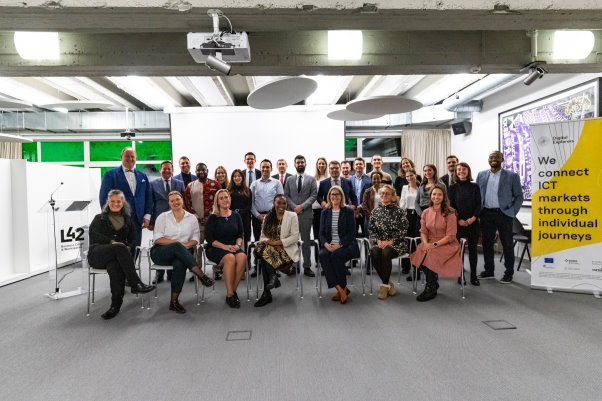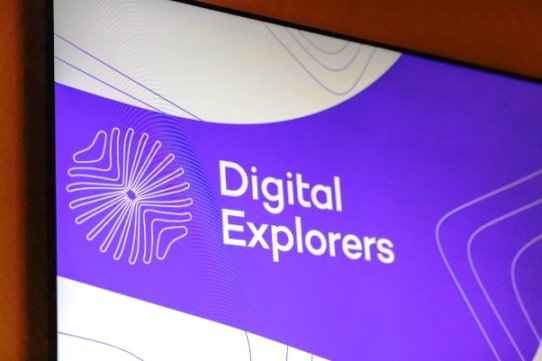Digital Explorers, a groundbreaking initiative fostering an ICT talent exchange between the Baltic nations (Lithuania, Latvia, Estonia) and partner countries (Kenya, Nigeria, Armenia) has been launched. The initiative will help meet demand for specialists and increase innovation and competitiveness inside the EU and in partner countries.
RELATED: Nigeria targets to train three million technical talents in four years
THE REALITY & BUSINESS UNTAPPED! Europe needs to attract and retain talent to power a strong digital economy. In recent years, the EU international partnership agenda began to focus on finding ways to promote skills development in order to fill the demand for specialists and to increase innovation and competitiveness both inside the Union and in partner countries around the globe. “Digital Explorers,” an ICT-focused knowledge and talent exchange initiative, has been at the forefront of this momentum by successfully implementing the first talent partnership pilot between Lithuania and Nigeria in 2019-2022. This year it is scaling to new countries.
New vista for tech talents in Nigeria, Kenya and Armenia
The second edition of Digital Explorers, this time led by three Baltic countries, Lithuania, Latvia, and Estonia, and partnering with Kenya, Nigeria, and Armenia, was recently launched in Brussels, with three dozen participants from around the world. The initiative plans to relocate 85 digital talents to Baltic front-runner tech companies through three specialised tracks (Professionals, Trainees, Ambassadors) and offer tailored training and career advancement opportunities to 65 IT specialists locally.
Anita Vella, Head of Legal Pathways and Integration at DG HOME expressed her fondness for the programme in her opening words saying that Digital Explorers is a prime example of a sustainable solution for building legal pathways between EU and partner regions. “There are a lot of training opportunities out there, but the key question is how to match these trained people with real jobs,” Vella noted, adding that Digital Explorers has found a concrete solution, which could become a stepping stone for others to build on and that having the Baltics join forces is a great example of the Team Europe spirit.


Lithuania’s Ambassador to the European Union, Mr. Arnoldas Pranckevičius, joined in complimenting the Baltic cooperation spirit for tackling mutual challenges. “I have watched this initiative grow over the years from its inception 5-6 years ago in Vilnius and now expanding its horizons,” he recollected. “The Baltics have vast experience with Eastern Partnership countries, though limited engagement with Africa. Nonetheless, ICT sector development, which is at the heart of Digital Explorers, offers mutual benefits for all countries involved,” the Ambassador noted.
Estonia’s Ambassador to Kenya and South Africa, Mr. Daniel Schaer, supported the idea of leveraging digital talent development for economic growth across continents. “In Estonia we call it the ‘Skype mafia’ effect,” he explained, saying how ex-Skype employees gave birth to new unicorns such as Bolt and Wise, proving that the tech sector can create a virtuous circle of innovation.
Unexpected connections, shared challenges
One of the guiding principles and success factors behind Digital Explorers is its close cooperation with IT companies and government institutions. The project board members – Mr. Fola Olatunji-David (Founding Partner at Kickoff Africa, and an Advisor to the Nigerian Minister for Communications, Innovation and Digital Economy) and Mr. George Njuguna Kamau (CIO of Safaricom, Africa’s largest telecommunications company) – both noted that there are numerous unexpected similarities between African and Baltic ICT ecosystems.


“I remember when my boss at the time told me to go check out Estonia for digital government solutions and I was like… ‘where is that?!’,” Njuguna Kamau recalled. “But when I got there, I was so inspired by the passion for e-governance solutions, start-ups and robotics and took a lot of the knowledge back home.”
Latvian Start-up Association Startin.LV CEO Olga Barreto- Goncalves said that while the Baltics’ digital success stories are renowned, talents are needed to keep the narrative progressing.
“Three Baltic countries have around 6.3 million people and a whopping 3000 start-ups, which is one of the highest per-capita figures in the world. But the rosy picture is tainted by the lack of talent to fill the needs in the tech sector,” Barreto- Goncalves laid out.
Fola Olatunji-David noted that a similar challenge exists in Nigeria: “We are lacking high-tech talent, so the government has started taking action and the drive is very much there.” He said that talent is becoming Nigeria’s new “oil” as the country is eagerly investing in training and outsourcing to fill the growing needs of the global technology sector.
George Njuguna Kamau said that Kenya is also jumping over different hurdles to grow its talent base. “Five years ago, when big tech started setting up in Kenya there was suddenly a huge hunt for talent and it seemed that the small pool of highly skilled people had all been quickly absorbed by Microsoft,” Njuguna Kamau said. The lack of senior talent is only solved by adequate and market-oriented training, he noted. “So, we turned to visiting universities and seeing that they are not producing graduates with sufficient skillsets. Therefore, we started actively discussing and pushing for the changes needed in the curricula.”
Migration is always circular
Besides relocation opportunities, the new iteration of Digital Explorers has set out to offer traineeships in partner countries so that talents can receive tailored and high-quality training with a local market fit. “In order to respond to the rapid changes in the world and for the partnership to be truly beneficial for all parties, we should innovate, not only in the digital transition, but also in the talent partnership, which is against brain drain, but supports brain gain, so the skills and abilities of people in the target countries increase,” said Kristi Kulu, Programme Manager for Education at ESTDEV.
“Migration is a natural phenomenon,” Fola Olatunji-David noted, adding that after placing trust in a candidate and offering life-changing chances to work and experience life abroad, specialists give back in multiple ways by investing in Nigerian companies, mentoring and amplifying the growth of the tech sector. Digital Explorers offers exactly this, building new experiences together with companies and talents, while at the same time expanding business horizons.
“I like the verb exploring, central to the name of this project, as it’s about being open to opportunities and not knowing what you’ll find. It is the backbone of innovation,” George Njuguna Kamau concluded.
In 2023-2026, the “Digital Explorers” programme is being implemented by a well-equipped consortium of Lithuanian think-and-do-tank OSMOS Global Partnerships, Estonian Center for International Development (ESTDEV) and Latvian Startup Association Startin.LV.































